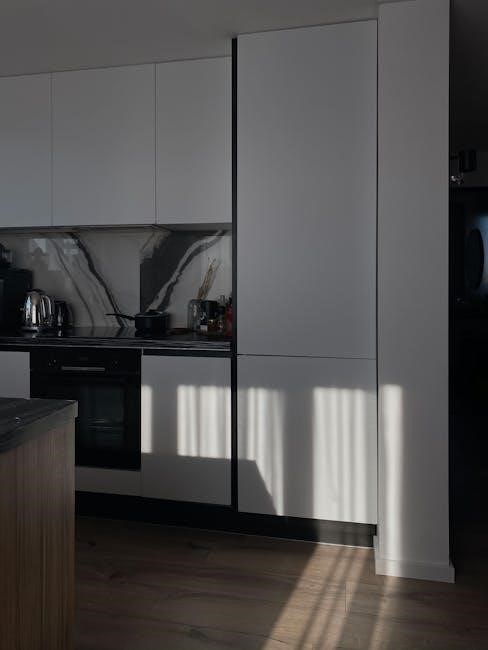Importance of Open House Feedback Forms
Open house feedback forms are essential for capturing visitor insights, improving property listings, and generating valuable leads. They help agents understand buyer preferences and enhance marketing strategies effectively.
1.1 Why Feedback Matters for Real Estate Agents
Feedback from open house visitors is crucial for real estate agents to understand buyer preferences and property perceptions. It provides insights into what attracts potential buyers, helping agents refine their marketing strategies. By identifying strengths and weaknesses of a listing, agents can make informed decisions to enhance the property’s appeal. Additionally, feedback forms serve as a tool to capture lead information, enabling follow-up communication and fostering relationships with prospective clients, ultimately driving sales and improving overall performance in the competitive real estate market.
1.2 Key Features of Effective Feedback Forms
Effective open house feedback forms should include clear, concise questions about the property, pricing, and buyer preferences. They should also capture visitor contact details for follow-up. Features like anonymity options can encourage honest responses, while mobile-friendly designs ensure accessibility. Customizable templates allow agents to tailor questions to specific properties or events. Including sections for overall impressions and suggestions for improvement helps gather comprehensive insights. Additionally, branding elements like logos and agent information reinforce professionalism and visibility, making the forms both functional and promotional tools for real estate agents. These features collectively enhance the value of the feedback collected.

Popular Templates for Open House Feedback Forms
Popular templates include JotForm’s free Real Estate Open House Feedback Form, Google Docs templates, and broker-specific forms. These are customizable, free, and designed to capture visitor details and feedback effectively.
2.1 JotForm’s Free Real Estate Open House Feedback Form
JotForm’s free Real Estate Open House Feedback Form is a versatile tool for gathering visitor insights. It’s customizable, mobile-friendly, and integrates seamlessly with other platforms. The form captures essential details like contact information and property feedback, helping agents identify potential buyers. Its user-friendly interface and GDPR compliance ensure data security. Agents can share the form via email or URL, making it accessible to all attendees. This tool is ideal for maximizing lead generation and improving marketing strategies based on visitor responses.
2.2 Google Docs Templates for Open House Feedback
Google Docs offers free, customizable templates for open house feedback forms, making it easy to collect visitor insights. These templates are mobile-friendly, allowing attendees to provide feedback on any device. Features include fields for contact details, property ratings, and open-ended questions. Agents can collaborate in real-time and easily export data for analysis. The templates are versatile, enabling realtors to tailor questions to specific properties. This tool is ideal for generating leads and gaining actionable insights to refine marketing strategies and improve buyer satisfaction.
2.3 Broker Open House Feedback Form Examples
Broker open house feedback forms are tailored for real estate professionals to gather detailed insights from attendees. These forms often include fields for visitor contact details, property ratings, and specific feedback on features like layout and amenities. Examples include customizable templates designed for brokers, allowing them to assess listing effectiveness and identify potential buyers. Many are available as free PDF downloads or editable documents, making it easy to distribute and collect feedback efficiently. These forms help brokers refine their strategies and improve client satisfaction.

How to Customize Your Open House Feedback Form
Customize your form by adding branding, contact details, and tailored questions to gather specific insights. This ensures the feedback is relevant and actionable for your goals.
3.1 Tailoring Questions to Your Needs
Tailoring questions in your open house feedback form ensures you gather relevant insights. Ask specific questions about the property’s condition, layout, and pricing to understand buyer preferences. Include open-ended fields for comments to capture detailed feedback. Consider adding questions about the attendee’s buying timeline and preferences to identify potential leads. Ensure your questions align with your marketing goals, such as gauging interest in specific features or amenities. This customization helps you refine your strategy and improve future open house events.
3.2 Adding Your Branding and Contact Information
Incorporating your branding and contact details into the open house feedback form enhances professionalism and visibility. Add your logo, name, and agency information to create a cohesive look. Include your email, phone number, and website to make it easy for attendees to reach out. This personalization helps build trust and ensures potential buyers can contact you directly. Branding also reinforces your identity, making the form memorable and aligned with your marketing materials.
Lead Generation with Open House Feedback Forms
Open house feedback forms are powerful tools for capturing visitor contact details and identifying potential buyers. They help agents follow up effectively, turning attendees into qualified leads.
4.1 Capturing Visitor Contact Details
Capturing visitor contact details is crucial for effective lead generation. Open house feedback forms often include fields for name, email, phone number, and address, allowing agents to follow up with potential buyers. This information helps in nurturing leads and building relationships. Many templates, like JotForm’s free Real Estate Open House Feedback Form, are designed to collect this data efficiently. Customizable forms ensure agents can tailor questions to gather the most relevant contact information, making follow-ups more personalized and effective. This data is invaluable for future marketing efforts and client communication.
4.2 Using Feedback to Identify Potential Buyers
Open house feedback forms provide valuable insights to identify potential buyers. By analyzing responses, agents can gauge visitor interest levels and preferences. Questions about property features and likelihood of making an offer help pinpoint serious buyers. This data allows agents to tailor follow-ups, addressing specific concerns or interests. Additionally, feedback highlights areas for improvement, ensuring properties meet buyer expectations. Effective analysis of feedback forms enables agents to prioritize leads, increasing the chances of successful sales and building strong client relationships. This targeted approach streamlines the sales process and enhances overall efficiency.

Legal Considerations for Feedback Forms
Ensure your open house feedback forms comply with data protection laws. Obtain clear consent for data usage to avoid legal issues and maintain participant trust.
5.1 Ensuring Compliance with Data Protection Laws
When creating open house feedback forms, ensure compliance with data protection laws like GDPR or CCPA. Clearly inform participants how their data will be used and stored. Obtain explicit consent before collecting personal information. Use secure platforms like JotForm or Google Docs to handle data responsibly. Anonymize feedback where possible to protect privacy. Regularly review and update your forms to align with evolving legal requirements. This ensures transparency, builds trust, and avoids legal penalties.

Best Practices for Distributing Feedback Forms
Distribute feedback forms digitally via email or URL for convenience. Use platforms like JotForm or Google Docs for easy sharing. Print versions are also effective for accessibility.
6.1 Digital vs. Print Formats
Digital formats, like PDFs or online forms, offer convenience and easy sharing via email or URL. They enable real-time data collection and analysis, making follow-up efficient. Print formats, while traditional, provide a tactile experience for on-site use. Digital tools, such as JotForm or Google Docs, are preferred for their accessibility and customization options, allowing agents to capture leads effectively. Print forms are best for immediate feedback during open houses. Choose the format based on event dynamics and audience preferences for optimal results.

Tools for Creating and Sharing Feedback Forms
Utilize tools like JotForm and Google Docs to create customizable feedback forms. Share forms via email or URL for easy access and efficient data collection.
7.1 Using Online Platforms Like JotForm
JotForm is a top choice for creating and sharing open house feedback forms. Its user-friendly interface allows real estate agents to design custom forms that match their branding. With JotForm, agents can gather visitor contact details and feedback seamlessly. The platform supports mobile responsiveness, ensuring forms work perfectly on any device. Additionally, JotForm offers features like conditional logic and integrations with other tools. Agents can share forms via email, URL, or embed them on websites, making it easy to collect valuable insights and leads efficiently.
7.2 Sharing Forms via Email or URL
Sharing open house feedback forms via email or URL simplifies data collection and ensures accessibility. Agents can send forms directly to attendees or embed links on websites and social media. This method allows visitors to provide feedback conveniently on any device. It also streamlines the process of gathering responses and analyzing data. By sharing forms this way, agents can maximize participation and efficiently collect insights to improve their strategies and engage potential buyers more effectively.

Examples of Successful Open House Feedback Forms
Successful forms include JotForm’s free template and Google Docs examples, offering customizable questions to capture visitor insights and preferences effectively, aiding in lead generation and strategy refinement.
8.1 Sample Questions for Buyer Feedback
Effective feedback forms often include targeted questions to gather actionable insights. Sample questions might ask about the overall impression of the property, its strengths and weaknesses, and whether it meets the buyer’s needs. Additional queries could focus on the realtor’s presentation, the quality of marketing materials, and the likelihood of recommending the property to others. Open-ended questions encourage detailed responses, while rating scales provide quantifiable data. These questions help agents refine their strategies and improve future open house events.
8.2 Case Studies of Effective Feedback Implementation
Real estate agents have successfully implemented open house feedback forms to enhance their strategies. Using JotForm’s free templates, one agent gathered insights that modified property listings, leading to faster sales. Another broker analyzed feedback to identify visitor concerns, adjusting marketing materials and boosting satisfaction. These cases show how effective feedback implementation directly impacts business outcomes, proving the value of these tools in real estate.
Open house feedback forms are invaluable tools for capturing insights, improving listings, and generating leads. Utilizing free, customizable templates ensures effective feedback collection and enhanced real estate strategies.
9.1 Maximizing the Value of Open House Feedback
To maximize the value of open house feedback, agents should analyze responses thoroughly, identifying common themes and areas for improvement. Follow up with attendees to address concerns and nurture leads. Use feedback to refine property presentations, enhance marketing strategies, and tailor future open house events. Leveraging free PDF templates ensures consistency and professionalism in feedback collection. By acting on insights, agents can improve client satisfaction, strengthen relationships, and ultimately boost sales. Regular review and implementation of feedback foster continuous growth and success in real estate endeavors.